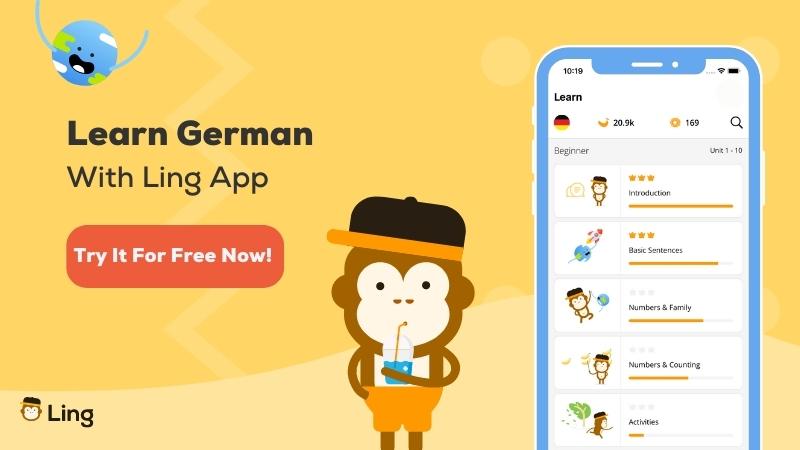When it comes to learning a new language, understanding the vocabulary related to employment is crucial, especially for those who are planning to work in a foreign country. In this article, we’ll explore the common Berufe or job titles in German and how to use them accurately in various contexts. After all, knowing the correct terminologies can make you appear more professional in front of your German colleagues and business partners. Now that’s something we can all get behind, right? Let’s begin!
Picture this: you’ve just landed your dream job in Frankfurt, and you’re about to meet your new colleagues for the first time. The excitement is through the roof as you strut your way to your new desk, but then it hits you – how exactly do you introduce yourself and your profession in German? Although it may seem like a simple point to worry about, nailing your introduction is mission-critical if you want to make a lasting impression.
Sure, as a foreigner, you might get a free pass to use English and be perfectly done with it. But as someone who has worked in different countries, I found out that taking the time to learn a few key phrases in the local language can go a long way in building meaningful connections and showing respect for the culture. It doesn’t matter if your short introductory spiel is memorized or something you strung together right on the spot, as long as you’re making an effort, you’re already ahead of the game.
The same thing proves to be true when you’re applying for a job in Germany. No matter what professions and industries you target, having the ability to read, write, and express yourself in German will certainly put you in a more favorable light and open up opportunities. In fact, the country has been consistently improving its visa policy to allow more foreign employees to work and live there. So if you put all that together, there is no better time to start learning German than today!
Now, before you start freaking out about signing up for expensive language apps or courses, you’ve got to remember one thing: It’s impossible to become fluent overnight! Our advice? Take it one step at a time and focus first on the sets of words and expressions that’ll be useful in real life, and that includes all the details we’ll cover in this post.
Ready to start learning? Let’s dive right into it!

How To Ask About Someone’s Job In German
In most countries, asking someone about their profession is a harmless conversation starter. But in some parts of the world, like Asia, this small talk topic is practically thrown around by everyone – from taxi drivers to street vendors to restaurant waiters. It’s a way to break the ice and make foreigners feel welcome.
However, it’s important to remember that not every culture operates the same way. In Germany, for example, personal space and privacy are highly valued, so it’s not common for locals to ask strangers about personal matters like their profession. But, if you do happen to form a closer relationship with someone, they may ask you the questions we’ll cover below.
Was sind Sie von Beruf?
This expression literally translates to “What’s your occupation?” and is regularly used in professional settings, like an interview or correspondence with someone of higher authority. By using the formal pronoun “Sie” or you in English, you are indicating that you acknowledge the seniority or position of authority of the one you’re speaking with or because you’re trying to be more formal with someone you don’t know yet)
Casual Ways To Ask About Someone’s Occupation
Now what if you’re in a more informal setting? Using “Was sind Sie von Beruf?” is great and all, but it might sound too strict when you’re speaking with acquaintances and close friends. In this case, here are the alternatives that you may hear from native speakers.
| English | German |
|---|---|
| What is your job? | Was ist dein Beruf? |
| What is your profession? | Was bist du von Beruf? |
| What do you do for a living? | Was machst du beruflich |
| What do you do for a living? | Was machst du beruflich? |
Unsure of what version to use? If in doubt, it’s always better to stay on the side of formality, especially in professional or formal settings. As much as we’d like to give you pointers on how to determine the context of the conversation, this is something that you have to play by ear. Depending on the tone, you may need to switch between formal and informal registers throughout the interaction.

How To Talk About Your Job Title In German
Looking to add some flair to your professional introduction in German? Well, you’re in luck because there are a few creative ways to do just that! To make it even easier, we’ve broken them down into sentence formulas that you can use with just about any job title. Let’s begin!
Ich bin + Job
“Ich bin” is the direct version of “I am” in English. It’s a common phrase that is used in a variety of contexts to express one’s identity or state of being. For example, “Ich bin glücklich” means “I am happy,” and “Ich bin müde” means “I am tired.” In the context of our topic in this post, we can complete this sentence by adding a job title immediately after “ich bin.”
- I am a student = Ich bin Student (masculine) or Ich bin Studentin (feminine)
- I am a translator = Ich bin Übersetzer (masculine) or Ich bin Übersetzerin (feminine)
Hold up! Did you catch that the German translations only contain three words? That’s right! Unlike in English, where we use the article “a” to complete the sentence, in German, you can omit the article, and the sentence will remain correct. Additionally, it’ll sound more colloquial. This means that the examples we gave earlier are grammatically correct and literally translate to “I am student” and “I am translator,” respectively.
Ich arbeite als + Job
This sentence formula is translated to “I work as” and is considered a more laid-back response. In this formula, we use the verb “arbeite,” which means “work” in English, and the word “als,” which means “a” or “an.”
- I work as a pilot = Ich arbeite als Pilot (masculine) or Ich arbeite als Pilotin (feminine)
- I work as a teacher = Ich arbeite als Lehrer (masculine) or Ich arbeite als Lehrerin (feminine)
Job Titles In German
Now that you’re no longer a stranger to how to formulate questions and responses, let’s now focus on the terminologies for the common job titles in German. Check out the table below to see which words you can use to complete the sentence formulas we covered in the previous section.

Creative Fields
The creative industries are an important part of the workforce in Germany. In fact, many companies are looking for talent in areas such as advertising, media, film, fashion, and design. If you find yourself in this field, here are the words that’ll surely help out.
| English | German (masculine) | German (feminine) |
| Actor | der Schauspieler | die Schauspielerin |
| Artist | der Künstler | die Künstlerin |
| Choreographer | der Choreograf | die Choreografin |
| Composer | der Komponist | die Komponistin |
| Dancer | der Tänzer | die Tänzerin |
| Designer | der Designer | die Designerin |
| Musician | der Musiker | die Musikerin |
| Photographer | der Fotograf | die Fotografin |
| Singer | der Sänger | die Sängerin |
| Stage director | der Regisseur | die Regisseurin |
| Voice actor | der Synchronsprecher | die Synchronsprecherin |

Professional Fields
Professional fields are a crucial part of the German workforce, and companies are always on the lookout for skilled professionals in areas such as engineering, law, medicine, finance, and education. If you are planning to work in Germany, use these words when explaining your professional experiences.
| English | German (masculine) | German (feminine) |
| Accountant | der Buchhalter | die Buchhalterin |
| Analyst | der Analyst | die Analystin |
| Architect | der Architekt | die Architektin |
| Chef | der Chef | die Chefin |
| Consultant | der Berater | die Beraterin |
| Dentist | der Zahnarzt | die Zahnärztin |
| Doctor | der Arzt | die Ärztin |
| Economist | der Betriebswirt | die Betriebswirtin |
| Engineer | der Ingenieur | die Ingenieurin |
| Financial advisor | der Finanzberater | die Finanzberaterin |
| Graphic designer | der Grafikdesigner | die Grafikdesignerin |
| Interpreter | der Dolmetscher | die Dolmetscherin |
| IT specialist | der IT-Spezialist | die IT-Spezialistin |
| Journalist | der Journalist | die Journalistin |
| Lawyer | der Anwalt | die Anwältin |
| Marketing manager | der Marketingmanager | die Marketingmanagerin |
| Pharmacist | der Apotheker | die Apothekerin |
| Pilot | der Pilot | die Pilotin |
| Political scientist | der Politikwissenschaftler | die Politikwissenschaftlerin |
| Programmer | der Programmierer | die Programmiererin |
| Psychologist | der Psychologe | die Psychologin |
| Social worker | der Sozialarbeiter | die Sozialarbeiterin |
| Statistician | der Statistiker | die Statistikerin |
| Supervisor | der Vorgesetzte | die Vorgesetzte |
| Surgeon | der Chirurg | die Chirurgin |
| Teacher (university level) | der Dozent | die Dozentin |
| Translator | der Übersetzer | die Übersetzerin |
| Web developer | der Webentwickler | die Webentwicklerin |

Service Industry
The service industry is an important sector in the German economy, employing a large number of people in fields such as hospitality, tourism, transportation, and customer service. Check out the words we rounded up below related to this field.
| English | German (masculine) | German (feminine) |
| Airline attendant | der Flugbegleiter | die Flugbegleiterin |
| Barber | der Friseur | die Friseurin |
| Beautician | der Kosmetiker | die Kosmetikerin |
| Concierge | der Concierge | die Concierge |
| Cook | der Koch | die Köchin |
| Delivery person | der Lieferbote | die Lieferbotin |
| Event planner | der Eventmanager | die Eventmanagerin |
| Hotel receptionist | der Hotelrezeptionist | die Hotelrezeptionistin |
| Housekeeper | der Zimmermann | die Zimmerfrau |
| Masseur | der Masseur | die Masseurin |
| Personal trainer | der Personal Trainer | die Personal Trainerin |
| Physical therapist | der Physiotherapeut | die Physiotherapeutin |
| Tour guide | der Reiseführer | die Reiseführerin |
| Valet | der Parkplatzwächter | die Parkplatzwächterin |
| Wedding planner | der Hochzeitsplaner | die Hochzeitsplanerin |
| Bartender | der Barkeeper | die Barkeeperin |
| Chef de cuisine | der Küchenchef | die Küchenchefin |
| Cook assistant | der Küchenhilfe | die Küchenhilfe |
| Food server | der Kellner | die Kellnerin |
| Gardener | der Gärtner | die Gärtnerin |
| Head gardener | der Oberhauptgärtner | die Oberhauptgärtnerin |
| Landscaper | der Landschaftsgärtner | die Landschaftsgärtnerin |
| Restaurant manager | der Restaurantleiter | die Restaurantleiterin |
| Sous chef | der Souschef | die Souschefin |

Science
Germany is known for its advancements in science and technology, making it a popular destination for professionals in fields such as physics, chemistry, biology, and engineering. With that said, here are the top translations for occupations in the German language that may prove useful to you.
| English | German (masculine) | German (feminine) |
| Astronomer | der Astronom | die Astronomin |
| Biochemist | der Biochemiker | die Biochemikerin |
| Botanist | der Botaniker | die Botanikerin |
| Chemist | der Chemiker | die Chemikerin |
| Entomologist | der Entomologe | die Entomologin |
| Geneticist | der Genetiker | die Genetikerin |
| Immunologist | der Immunologe | die Immunologin |
| Marine biologist | der Meeresbiologe | die Meeresbiologin |
| Medical researcher | der Medizinforscher | die Medizinforscherin |
| Microbiologist | der Mikrobiologe | die Mikrobiologin |
| Neurologist | der Neurologe | die Neurologin |
| Ornithologist | der Ornithologe | die Ornithologin |
| Paleontologist | der Paläontologe | die Paläontologin |
| Physicist | der Physiker | die Physikerin |
| Physiologist | der Physiologe | die Physiologin |
| Zoologist | der Zoologe | die Zoologin |

Academic Field
Planning to teach? Germany is home to some of the world’s top universities and research institutions, making it a hub for academic professionals in fields such as humanities, social sciences, natural sciences, and engineering. To help you translate what you do for work, here are the top words you may use.
| English | German (masculine) | German (feminine) |
| Dean | der Dekan | die Dekanin |
| Graduate student | der Doktorand | die Doktorandin |
| Professor | der Professor | die Professorin |
| Research assistant | der wissenschaftliche Mitarbeiter | die wissenschaftliche Mitarbeiterin |
| Teaching assistant | der Lehrassistent | die Lehrassistentin |
| Tenure-track professor | der Juniorprofessor | die Juniorprofessorin |
| Lecturer | der Dozent | die Dozentin |
| Department chair | der Fachbereichsleiter | die Fachbereichsleiterin |
| Academic counselor | der Studienberater | die Studienberaterin |
| Librarian | der Bibliothekar | die Bibliothekarin |
| Student advisor | der Studienberater | die Studienberaterin |
| Lab assistant | der Laborassistent | die Laborassistentin |
| Coach | der Trainer | die Trainerin |
| Elementary school teacher | der Grundschullehrer | die Grundschullehrerin |
| Middle school teacher | der Hauptschullehrer | die Hauptschullehrerin |
| High school teacher | der Gymnasiallehrer | die Gymnasiallehrerin |
| Special education teacher | der Sonderpädagoge | die Sonderpädagogin |
| School counselor | der Schulberater | die Schulberaterin |
| School nurse | der Schulkrankenschwester | die Schulkrankenschwester |
| School psychologist | der Schulpsychologe | die Schulpsychologin |
| School social worker | der Schulsozialarbeiter | die Schulsozialarbeiterin |
| School administrator | der Schulverwalter | die Schulverwalterin |
| School secretary | der Schulsekretär | die Schulsekretärin |
| Physical education teacher | der Sportlehrer | die Sportlehrerin |
| Music teacher | der Musiklehrer | die Musiklehrerin |
| Art teacher | der Kunstlehrer | die Kunstlehrerin |
| Foreign language teacher | der Fremdsprachenlehrer | die Fremdsprachenlehrerin |

Government Services
Germany has a well-established government system, with a variety of opportunities available for professionals in areas such as law enforcement, public administration, foreign affairs, and civil service. If you find yourself being invited to work for the German government, here are the translations you need to learn.
| English | German (masculine) | German (feminine) |
| Ambassador | der Botschafter | die Botschafterin |
| Civil servant | der Beamte | die Beamtin |
| Diplomat | der Diplomat | die Diplomatin |
| Elected official | der Mandatsträger | die Mandatsträgerin |
| Government administrator | der Verwaltungsbeamte | die Verwaltungsbeamtin |
| Government attorney | der Staatsanwalt | die Staatsanwältin |
| Judge | der Richter | die Richterin |
| Law enforcement officer | der Strafverfolgungsbeamte | die Strafverfolgungsbeamtin |
| Legislator | der Gesetzgeber | die Gesetzgeberin |
| Public defender | der Pflichtverteidiger | die Pflichtverteidigerin |
| Tax collector | der Steuereintreiber | die Steuereintreiberin |
| Auditor | der Rechnungsprüfer | die Rechnungsprüferin |
| Customs officer | der Zollbeamte | die Zollbeamtin |
| Foreign service officer | der Beamte im auswärtigen Dienst | die Beamtin im auswärtigen Dienst |
| Intelligence officer | der Geheimdienstmitarbeiter | die Geheimdienstmitarbeiterin |
| Mayor | der Bürgermeister | die Bürgermeisterin |
| Minister | der Minister | die Ministerin |
| Policy analyst | der Politikanalytiker | die Politikanalytikerin |
| Political scientist | der Politikwissenschaftler | die Politikwissenschaftlerin |
| Public affairs specialist | der Pressesprecher | die Pressesprecherin |
| Firefighter | der Feuerwehrmann | die Feuerwehrfrau |
| Paramedic | der Rettungssanitäter | die Rettungssanitäterin |
| Police officer | der Polizist | die Polizistin |
How To Talk About Where You Work In German
If you find yourself asked the question, “Wo arbeiten Sie?” it would be wrong to answer using our Ich bin and Ich Arbeite Als formula. In this case, your answer should be structured like the following:
- I work at Google = Ich arbeite bei Google.
- I work in Berlin = Ich arbeite in Berlin.
Basically, you use the “bei” version when you want to mention the specific name of the company. On the other hand, you use the “in” version for more general contexts, like when you want to state the place, city, or country where you’re working.
Your Top Questions Answered
What Is Occupation Called In Germany?
In Germany, the word for occupation is “Beruf.” Other related words include “Arbeit” (work), “Job” (job), and “Tätigkeit” (activity or occupation).
How Do You Introduce Your Profession In German?
To introduce your profession in German, you can use the phrase “Ich bin + your profession” or “Ich arbeite als + your profession.”
How Do You Ask About Someone’s Occupation In German?
To ask someone’s occupation in German, you can use the question “Was sind Sie von Beruf?” which translates to “What is your profession?”
What Are The Main Occupations In Germany?
The main occupations in Germany include professionals in the fields of engineering (Ingenieurwesen), IT (Informationstechnologie), healthcare (Gesundheitswesen), education (Bildungswesen), finance (Finanzwesen), and business management (Unternehmensführung).
Over To You
Learning the translations for job titles in German may seem daunting, especially if you’re not familiar with the language. However, being able to express yourself in German when introducing yourself and your profession is a valuable skill that can help you make connections and succeed in your career in Germany.
Don’t be discouraged by the initial difficulty of learning these translations, as there are many great educational resources available that can help you improve your German language skills. Whether it’s through language courses, language learning apps, or online resources, there are many ways to learn and practice your German skills. By dedicating time and using our most recommended app for German, you can improve your communication skills and increase your chances of success in the German job market.
Ready to find out what this app is?

Learn German With Ling
If you’re looking for resources to help you learn German and improve your communication skills in the workplace, Ling is a great option. This powerful language-learning app offers a range of in-depth language lessons not just for German but also for 60+ languages! From basic vocab to actual grammatical structures, this app got your back!
Its secret to success? Ling comes with interactive exercises, engaging gamified lessons, and a chatbot to help you improve your speaking, listening, reading, and writing skills at your own pace. Whether you’re a beginner or an advanced learner, Ling can help you advance your proficiency steadily. Download it now from the App Store or Play Store to give it a spin!


































































